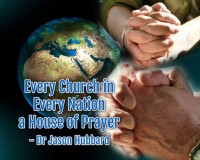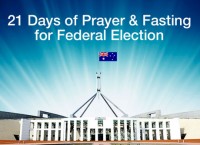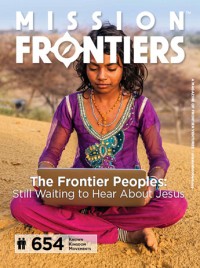Ramadan 2019: 6 May to 5 June
Muslims around the world begin the holy month of Ramadan on Monday 6 May. Over the following thirty days, they will fast each day as they intentionally seek Allah, presenting incredible opportunities for them to encounter Jesus instead! We can ask God to lead us in prayer for Muslims around the world to come into a living faith in Jesus Christ. There are many resources available to help us pray: one is the 30 Days of Prayer for the Muslim World. By joining this movement, you will be joining the Holy Spirit’s work in drawing Muslims to Christ. An illustrated prayer guide booklet has daily readings that focus on various topics, people groups and geographical areas of the Islamic world; each day’s subject focus is followed by prayer points. It also features informative background articles and resources for involvement.
China: paying people who report ‘illegal’ churches
China has upped its persecution of Christians, with Communist party officials in Guangzhou offering a reward of up to 10,000 Chinese Yuan (approximately £1,162) to those who can provide information about underground churches, secret Christians, religious leaders, and others involved in ‘illegal’ religious activity. Smaller rewards are offered for information about churches and other religious meeting places built or used without official permission. The regulation is called ‘Incentives to Motivate the Masses to Report on Illegal Religious Activities’. The persecution watchdog China Aid says that the new regulations will significantly increase the persecution of Christians in this officially atheist country. Inciting people to report on others with monetary incentives only appeared during the Cultural Revolution, when children would report their parents, a wife would report her husband, and colleagues would report one another.
India: unreached people
Evangelicals believe the ‘evangel’ or Good News brings salvation through faith in Jesus Christ. Nearly 10% of the world’s population are now evangelical believers. About 33% of the world’s population identify themselves as Christian. Out of all the regions in the world, India has the fewest Evangelicals or Christians. Unreached peoples and non-believers need missionaries either in their own people group or from abroad to ‘reach them with the message of God’s salvation for them through His Son Jesus Christ’. India is second only to China in having the most isolated peoples, with virtually no Christians of any kind in their own people group. Today almost half of the non-believers are culturally near to significant numbers of believers. The remaining missionary task of reaching these non-believers is smaller than ever before. However, the vast majority of missionaries are still going to the ‘Christian’ areas of the world.
Mozambique left in ruins by second cyclone
For the first time in recorded history, Mozambique has been hit by two cyclones in one season. Category 4 Kenneth arrived six weeks after Idai killed 600+ people with flooding. Kenneth killed at least 41 people and destroyed thousands of homes across northern Mozambique. Ibo Island was particularly hard hit, receiving food aid only six days after Kenneth destroyed thousands of homes. The human cost of the disaster is only now being revealed. The UN described reaching Ibo as ‘incredibly difficult’. Initial estimates are that 90% of structures were damaged. ‘If somebody hasn’t lost everything, he’s a lucky guy because no-one has escaped,’ said a motorcycle taxi driver. Almost everybody lost their belongings. The World Food Programme said that Kenneth dumped twice as much rain as Idai, nine inches, or about a quarter of the average annual rainfall for the region - again raising concerns about climate change. See
Burkina Faso: motorcycle gunmen kill Christians in church
Motorcycle gunmen, suspected to be Islamist militants, sprayed bullets at Christians attending a church service in Burkina Faso, killing a pastor and at least four others, according to local reports. A further two Christians are said to be missing following the early afternoon bloodshed on Sunday 28 April in the small northern town of Silgadji. The attackers fled north towards the country’s border with Mali. A rising tide of Islamic extremism in Mali has produced growing terrorism that is now spilling over into impoverished Burkina Faso, which is over 50% Muslim and about 20% Christian. Two days earlier Islamists were blamed for murdering five teachers and another worker at a school in the east of the country.
Venezuela: violence, Hezbollah, drug production
29 April was a day of chaos and violence after opposition leader Juan Guaidó called for a military uprising in Caracas and urged supporters to take to the streets to force his rival Nicolás Maduro from power. The US secretary of state, Mike Pompeo, said that Maduro had told America that he would leave Venezuela and live as an exile in Cuba and had an airplane on the tarmac, ready to leave: then Russia convinced him to stay. Recently Russian military personnel entered Venezuela to keep its sophisticated S-300 surface-to-air missiles operational despite its crumbling infrastructure and frequent power failures. Also Tareck El Aissami, Maduro’s closest confidant, is being investigated by the intelligence agency about helping Hezbollah militants into the country, partnering with a drug lord, and shielding 140 tons of chemicals to be used for cocaine production - making him a rich man as Venezuela spiralled into poverty. See
When Jesus came into the temple, he drove out the money changers and declared, “Is it not written, ‘My house shall be called a house of prayer for all nations”? But you have made it a den of robbers.’” It is clear that Jesus’ declared intention that “His house” (today the assembled church and our physical bodies as His living temples) should be a house of prayer for all nations (Isaiah 56:7, Mark 11:17; 1 Corinthians 3:16, 6:19).
The Old Testament Temple was to be a dwelling place of God’s presence. It was to be a focal point of worship, prayer, sacrifice, and joy. It was to be a place where His people would humble themselves, pray, and seek His face – turning from their wicked ways for healing, blessing and restoration (2 Chronicles 7:14).
But what does this reality look like for our lives and churches today? What does Jesus desire of us if we are to be agenuine house of prayer indeed, not just in word?
5 Biblical Indicators of a True House of Prayer.
First, prayer was to take priority over all self-centered activities of commercialized religion. Jesus’ anger over the money changers in the temple was rooted in the self-serving system created to use funds from the sales of sacrificial animals for their own gain. He called it a “den of robbers.” The house of prayer is to be a place of humility, and sacrifice. It was not to be a place for the financial, or selfish advancement of its leaders.
Second, prayer is both the churches identity as well as it’s ministry work! Prayer isn’t just one of the ministries of the church. The whole church is to be engaged in prayer. The church is called to be ‘devoted’ to prayer (Acts 2:42, Rom 12:12, Col. 4:2, Eph 6:18).
“Rejoice in hope, be patient in tribulation, be devotedin prayer.”
The word devoted literally means to be ‘diligently occupied with, to constantly persist in, or to be dedicated/appointed for a task.’Paul calls the church at Ephesus to make prayer first in the church, “First of all, then, I urge that supplications, prayers, intercessions, and thanksgivings be made for all people” (1 Tim. 2:1).When we make prayer a priority, we come to God dependent on him, knowing that we can do nothing apart from him (John 15:5). God releases his power in response to the prayers of his people. When we pray according to his will and for his renown, God always responds and increases his activity! As Hudson Taylor wrote, “When we work, we work, but when we pray, God works.”
Third, prayer is to be modeled first in the leadership culture of the church. The story in Acts 6:1-7 is a powerful model for a biblical leadership culture. The leaders gave themselves to continual “prayer and the ministry of the word” (Acts 6:4). Supernatural blessing and expansion followed (see v. 7). A genuine house of prayer is guided by leaders who spend extraordinary amounts of time together in prayer because they have a conviction that God is the true source of all power, unity, direction, and blessing.
Fourth, Jesus described the house of prayer in John 2:16 as his Father’sHouse of prayer. The Father has always been longing for a family (sons and daughters) and a home (to dwell with them). In teaching his disciples how and what to pray, Jesus called them to pray, “Our Father.” Jesus re-orientated prayer as ‘sons and daughters’ before a good Father! The Spirit would place an “Abba” cry in the hearts of his people, leading them to pray with the same intimate language that Jesus prayed to his Father. As Paul described in Romans 8:14-17,
“For all who are led by the Spirit of God are sons of God. 15For you did not receive the spirit of slavery to fall back into fear, but you have received the Spirit of adoption as sons, by whom we cry, “Abba! Father!” 16The Spirit himself bears witness with our spirit that we are children of God, 17and if children, then heirs—heirs of God and fellow heirs with Christ, provided we suffer with him in order that we may also be glorified with him.”
The word ‘house’that Jesus used is oikos, meaning household, family, or dwelling. This makes sense since the primary identity of the church in the New Testament is as ‘family.’ Family terminology is Paul’s primary and most used metaphor describing the identity of the church (sibling terminology 118x’s, Father terminology 40x’s, and inheritance terminology 14x’s).
And the distinguishing value of the family of God is ‘love’ for one another. As Paul writes,
“In brotherly love, showing family affection to one another. Outdo one another in showing honor” (Romans 12:10).
One of the best ways that we can love one another is to pray for them. Our prayers must be love-motivated. As Dr. Alvin VanderGriend writes,
“Love-motivated prayer is a love-motivated plea to a love-giving God, on behalf of love-needy persons who live in a love-starved world.”
Fifth, Jesus describes the house of prayer to be “for all nations.” Prayer was the fuel for Spirit-inspired mission fulfillment. In a true house of prayer, prayer is not the end – but the means to the end. Prayer exists to empower us to accomplish the Great Commission of Christ in the power of Christ and for the glory of Christ.
George Otis shares a story about a church in Cali, Columbia that at one point was adding 1000 people to their church every month for forty months! He asked the leaders what their strategy was in reaching so many for Christ. His answer was simple, “our church prays 24/7!”
Prayer precedes conversion. Prayer precedes mission.There is no other way to do His work and reach this lost world with the truth of the good news than connecting with God’s heart in fervent, continual prayer!
May God call us to become increasingly, “Prayer-Devoted” in our personal lives, families, churches, and ministries! As my good friend Brian Alarid, founder of America Prays/World Prays says, “Every church in every nation - a House of Prayer!”
Dr Jason Hubbard - Executive Coordinator
International Prayer Connect
21 Days of Prayer & Fasting 28 April – 18 May 2019
“If My people who are called by My name will humble themselves and pray and seek My face, and turn from their wicked ways, then I will hear from heaven, and will forgive their sin and heal their land.” - 2 Chronicles 7:14
We ask for Christian leaders and churches of all denominations from all over the world to pray for Australia, as wethe People of Australia, Pray and Fast for 21 days up to the Federal Election, Saturday 18 May 2019. This prayer call was inspired by Ps Margaret Court’s love for Australia, her passion “for the church to arise and be a strong voice for righteousness, truth and justice”and her love for the word of God which says that, “Righteousness exalts a nation, but sin is a reproach to any people.”Proverbs 14:34.
“Hear me, O LORD, hear me, that this people may know that you are the LORD God, and that you have turned their heart back to you again.”1 Kings 18:37
- Pray that God would rule over this election that righteous leaders would be elected to govern Australia in truth and justice because, “When the righteous are in authority the people rejoice.”Proverbs 29:2
- Pray God’s blessing upon Australia’s parliamentarians and leaders, including their families and all the candidates of all the parties standing for this federal election.1 Timothy 2:1-3
- Pray for a multiplication of prayer and unity across the Body of Christ in Australia that people will wakeup to the dangers facing our nation and respond in prayer. Ephesians 5:14
- Pray for a Spiritual Awakening for Australia, Revival and Transformation for Australia and the proclamation of the Gospel of the Lord Jesus Christ. John 3:16
Warwick Marsh
Promo Video: https://www.youtube.com/watch?v=rTowvtNdkzc
Facebook Video: https://www.facebook.com/nationaldayofprayerandfasting/videos/386871382169790
For More Info &Daily Devotions: http://www.canberradeclaration.org.au/prayer/election-2019
God is moving the Body of Christ to prayer. The prayer and mission movements are connecting as we see in May 2019 three major prayer thrusts aimed at the unreached.
“Year of the Frontier” May 2019 through June 2020 focuses prayer on the largest people groups with the least access to the gospel—May 2019 highlights the largest 31 groups, all over 1 million population. Joshua Project, Global Prayer Digest, the Ethné Movement, the 24:14 Coalition and many others offer a myriad of resources to facilitate effective, fervent, specific prayer. More on this year-long effort next month, but check out the Nov/Dec 2018 issue of Mission Frontiers Magazine to read more and connect with resources: http://www.missionfrontiers.org/pdfs/MF40-6_Nov-Dec_eBook.pdf . Also, don’t miss the new podcast by Alliance for the Unreached: https://alliancefortheunreached.org/podcast/
For more than twenty-five years now, the annual 30 Days of Prayer for the Muslim World calls the church to make a deliberate but respectful effort to learn about, pray for and reach out to our world’s Muslim neighbors.This international movement began in 1993 and coincides annually with the important Islamic month of religious observation — Ramadan, a time of the year when Muslims are much more deeply aware of spiritual matters. This year we pray May 6 to June 4.
It was launched by a group of Christians who felt inspired to challenge the way they understood Muslim people. What if they saw Muslims in the same way God does? While media sound bites about Islamic extremism can too easily incite anger, fear and even hatred towards Muslims, these believers seek to resist this temptation to generalize, and instead, resolve to respond and pray with the mind and heart of Christ. The editorial work for this prayer movement was initially coordinated in Australia, then in France, then in Germany and then in the UK. The North American edition has been published continuously since 1993 by WorldChristian.com.
“It is not our intention with this prayer focus during Ramadan to disparage Islam or Muslim sentiments in any way. We recognize that humans and the Muslim world are far too complex to simply condense or explain with a mere booklet. However, at the same time, it is our sincere desire that Muslims the world over would have the opportunity to freely understand and consider the Good News — Jesus Christ.”
Thousands of ministries and churches from many denominations participate regularly. Many participants have commented on how much they have learned about Islam, and how their negative attitudes about Muslims have been changed as they read about, prayed for and even reached out to Muslims. Here are suggestions to consider:
- Order additional booklets (bulk-discounts start at 10 copies) to hand out, or to sell: https://www.worldchristian.com/product/30-days-muslim-prayer-guide-2019.
- Download, print and display the poster on bulletin boards at work and in churches: https://www.30daysprayer.com/resources/downloads/.
- Feel free to use their images and text to promote “30 Days” in your communication channels: https://www.30daysprayer.com/resources/downloads/.
- Let your Facebook friends know.
- Organize a meeting a couple weeks before Ramadan starts to talk about it.
Furthermore, Love Muslims is launching! Chris Ruge is ecstatic to share that Prayercast is launching Love Muslims – the most comprehensive and compelling Muslim-focused prayer resource the world has ever seen!
Over 130 new 4-5 minute videos will lead the Body of Christ in focused, strategic, passionate prayer for the Muslim world. Each video is led by a former Muslim who now follows Jesus!
“We’re rallying the Church around the world to join us in prayer each day during Ramadan, and we’ll be releasing a brand new video each day. Would you prayerfully consider SHARING this and INVITING your network to join in prayer through Ramadan.”
Specifically, would you do the following?
- INVITE your mailing list, networks, and partners to join in prayer - including all the MENA prayer groups!
- SHARE about the movement through your social media and other communication channels.
- SIGN UP yourself and pray with us!
We want to make this as easy for you as possible. We have a series of media tools to make sharing Love Muslims easy and clear for both you and your community. Click to see a special preview of one of the videos: https://vimeo.com/291193744/3f1af42f77 Our heart cry is to gather as many people to pray with Love Muslims as we can leading up to Ramadan. Would you help spread the word? Forward this to everyone you know who should be joining in prayer. Share about the movement on social media using #LoveMuslims and directing your friends and followers to www.LoveMuslims.org
Whichever tools you use, join the millions of Christians around the world, and churches and ministries from many denominationsbeginning May 2019, including from May 6 to June 4, 2019 during the season of Ramadan, to understand and to persistently pray for our unreached neighbors and nations.
Liz Adleta
Global Prayer Strategist serving
Fellowship of Prayer Strategists, the Ethne Movement, & the 24:14 Coalition
The 24:14 Community is challenging our prayer partners to join in 21 days of prayer and fasting as God leads for the acceleration of movement engagement in every unreached people and place by 2025. Click on the link below for a two-page reusable 21-day prayer guide to focus your prayers and provide specific prayer points for Church Planting Movements.
Pray
- Pray for the upcoming Ibero-America regional meeting, that out of it a regional team will be formed that spearheads movement engagement of all remaining unreached peoples and places in the region.
- Pray for movement leaders globally to share movement data with 24:14 so that we have a complete picture of the remaining gaps to share.
- Pray for volunteer translators for every major language to translate the 24:14 website, vision book, and other materials
- Pray for every country of the world to be covered by Geographic Stewardship Team members who ensure movement engagement
More: https://inheritthenations.net/2414-coalition-prayer-involvement/21-days-of-prayer/










